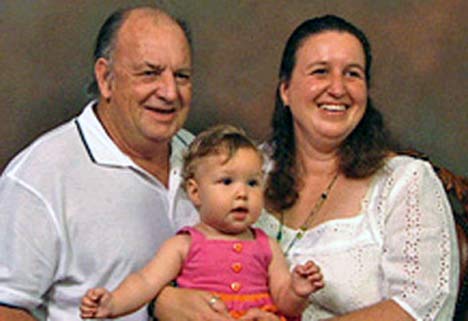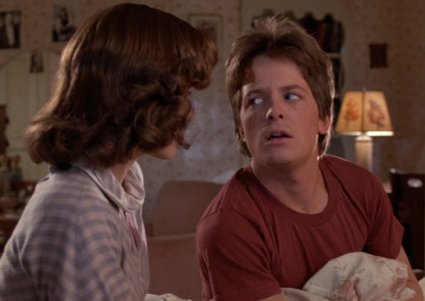
All in the family: The Deaves and their offspring, Celeste
I was prepared to walk away from posting about this London Times piece, “I had sex with my brother but I don’t feel guilty,” on mere ick factor alone:
On New Year’s Eve Daniel went to a party and by the time he got home I was already asleep. I was extremely sleepy when he crept into my room and curled up on my bed, which was something we’d both done for years, especially if we wanted to share some snippet of gossip. When he started stroking my hair and face it was a surprise, but I could feel myself drifting pleasurably back to sleep as he caressed me gently. Then I became aware of his hand drifting lower and suddenly I was wide awake as he stroked my neck and started sliding his hand down my vest top. I wasn’t scared but I was surprised as he started stroking me, though my overriding sensation was one of sheer pleasure. I instinctively lifted my mouth to his as he kissed me and then he hugged me very tightly and left.
Then I saw the article had generated 347 comments, but, even more, many actually approved of the arrangement, or at least were tolerant of it.
But even that was before I watched an Australian 60 Minutes video (via Jezebel) of John, 61, and Jenny, 39, Deaves, a father-daughter / common-law husband-wife couple from that country, and their granddaughter / daughter / half-sister, Celeste, 8 months of age, above.
 The piece also profiled a Scottish couple of half-siblings, though it doesn’t mention the Germans ones of which I’d heard first. Thinking about the Deaves, of course, reminded me of Kathryn Harrison’s controversial 1997 memoir, The Kiss, which details an adult sexual relationship with the author’s father. The title of that 1994 movie I’ve never seen, Spanking the Monkey, was still floating around in my head, too.
The piece also profiled a Scottish couple of half-siblings, though it doesn’t mention the Germans ones of which I’d heard first. Thinking about the Deaves, of course, reminded me of Kathryn Harrison’s controversial 1997 memoir, The Kiss, which details an adult sexual relationship with the author’s father. The title of that 1994 movie I’ve never seen, Spanking the Monkey, was still floating around in my head, too.
I was starting to drown. Is incest, somehow, becoming hip? How did so many otherwise sane, normal, adults come to agree that the hottest sex is with one’s next-of-kin?
In the case of the Deaves, at least, some partially blame a phenomenon called genetic sexual attraction, or GSA: A compulsion to have sexual relations with relatives, from whom one has been separated since infancy, once reunited. I know it sounds like a disease somebody made up, but according to a 2003 piece in the UK’s The Guardian,
The emergence of GSA both in the US and the UK coincided with the relaxation of adoption laws in the mid-1970s, which gave adopted children easier access to their records and led to an increase in the number of reunions between adoptees and their blood relatives.
The unexpectedly high number of reported cases of men and women struggling with sudden and terrifying emotions after a reunion has surprised and perplexed most post-adoption agencies. So far, because of the taboos surrounding GSA and its variable and complex nature, the frequency of these cases is almost impossible to quantify, although some agencies estimate that elements of GSA occur in 50% of reunions. Growing awareness of its potentially devastating implications, especially in cases where relatives embark on a sexual relationship, has prompted some organisations to warn all clients attempting to trace a relative about the phenomenon, while also training counsellors to recognise the warning signs and to help adoptees and their families cope with the damage.
 Plus, when you think about it, it’s amazing how many longstanding pop cultural narratives, otherwise unremarkable, are based, at least in part, on this idea. Oedipus is the obvious reference, but Star Wars‘s Luke and Leia, anyone? Back to the Future‘s Marty and Lorraine, right? The condition even has its own web site and support group, not to mention scholarly research, all of which, again, will probably be convincing to no one except people who suffer from it.
Plus, when you think about it, it’s amazing how many longstanding pop cultural narratives, otherwise unremarkable, are based, at least in part, on this idea. Oedipus is the obvious reference, but Star Wars‘s Luke and Leia, anyone? Back to the Future‘s Marty and Lorraine, right? The condition even has its own web site and support group, not to mention scholarly research, all of which, again, will probably be convincing to no one except people who suffer from it.
In her book, I’m His Mother, But He’s Not My Son, Barbara Gonyo, widely credited with naming GSA, describes how her life was flipped when, at 42, she met her twenty-six-year-old son, whom she’d given up for adoption when she was 16.
“My behavior was atrocious,” she says. “I was flirtatious, coquettish and playful. When I was getting ready to see him, I primped and preened, becoming like a 16-year-old in mind and body. I was trying to win him over, like someone I wanted to date or marry. I knew I couldn’t be his mother, because he had one, so the next best thing would be the next best kind of a relationship – a lover. After all, what could be more intimate?”
Barbara, who married her second husband, Bob, in 1966, admits that what saved her own marriage and enabled her eventually to build a healthy relationship with her son was that she didn’t have sex with him because he showed no interest. Instead, she directed her heightened sex drive towards her marriage. Even so, it didn’t prevent her feeling attracted to her son.
“I’d make up excuses for my son to come around, and even though he told me he wasn’t a touch-feely person, I couldn’t control myself. When my hugs lasted too long I’d feel him tense up. I knew he wasn’t comfortable but I couldn’t help myself. I was aching for him.”
Why did she react this way?
Barbara is convinced that her craving for physical intimacy with her son was the delayed by-product of “missed bonding”, which would have normally taken place between a mother and her newborn infant. She also believes her growing romantic feelings for her son came about because she was asked to relinquish any motherly impulses. “Mitch called me Mum only in the first month.” says Barbara, who lives in Mount Prospect, Illinois. “His adopted mother found out and cried, and he never called me Mum again. Instead, he requested I view him as a friend. I was Barb, not Mum. I had to try to remember he had another mother, and that I wouldn’t be able to take her place.”
In the article cited directly above, one adoption expert calls GSA associated with in-vitro fertilization births—first achieved exactly three decades ago this year—”a time bomb waiting to go off.” Fascinating. I mean, as humans, I believe that, in truth, we are all related, but this is ridiculous.

11 comments ↓
2 Timothy 3:1-5
Amen sister! If incest is becoming acceptable then the end of days can’t be far off. And what’s up with a media that reports on this breathlessly and without judgement, as though merely quoting some bad romance novel? Ugh, we’re doomed.
Wasn’t most of Europe’s royal families inbred? I blame them.
I think all incest is patently disgusting; especially bewildering is consensual incest. As a writer though, I couldn’t help exploring the idea. People always question what would motivate someone to kill; for example. In my novel, THE BREVITY OF THE SELVES (ISBN-13: 978-0-6151-6686-8); I ultimately examine the question — “What would make someone willingly hump their blood relative?” A poor child is victimized; but what is the deal with the grown folks? I was amazed to see the evolution/ deterioration of my main character along those lines.
I don’t think it’s becoming hip… I think people have become very good at rationalizing their choice to go full throttle against a major societal taboo.
And I expect to hear incest practitioners to compare their struggle for acceptance to a civil rights struggle.
I think it has become hip. I have noticed a huge number of people my age, which is out of high school / in college having sex with their own brother or sister and saying that nothing can compare. I am fine with it. It isnt any worse than homosexuality.
islam is the answer for this problem
Poor kid, her dad is her grandpa. Her mom is her half sister. Even I got confused reading that, can only imagine what that’s gonna feel like in 15 years for her.
Nice blatant plug #4, #7, you are just as bad as #1.
#3, most of European royalty would marry royalty from another state to form a married alliance so even if they were inbreeding, they would still have a more diverse gene pool than the Deaves here.
GSA, Genetic sexual attraction, should be called NMA Narcissistic Mirror Attraction.
Genetic link is not the attraction. The physical likeness is. “OMG this attractive younger person looks like a perfect mirror image of ME!” For the younger/more attractive member “OMG this person who looks like ME makes ME feel like GOD!”
There is a metaphysical link. But those who ACT ON the physical impulse cannot claim it.
The biggest losers in these narcissistic act out are not just the adoptive parents, but the current respective spouses of the GSA sociopaths. It’s like entering twilight zone when your husband or wife insist on having “soulmate sex” (translation: narcissistic god-like anti-social selfish destructive sex) with their “genetic” family members.
Warning to those GSA curious – cross the line, you’ll stand a 99% chance of losing that physical mirror person as a “related friend” forever. Nevermind your spouse, your children, nevermind your adoptive parents’ feelings, think of your own social identity. It is more important than a experiment in god-like sex.
To GSA sociopath’s long-suffering spouses – you are not crazy. They are. You have to be strong and prepare yourself (and your children) for the worst. The enemy of your marriage and family is a devil of the most peculiar sort. Seek professional support immediately. Do not be permissive, do not compromise, or you’ll regret it.
It’s interesting to see how many contributors know almost nothing of GSA, as evidenced by their lack of sympathy and their glib treatment of the syndrome. You need to read SOAR GSA.
Well, it’s taking a long time, isn’t it? What’s the problem?
Leave a Comment